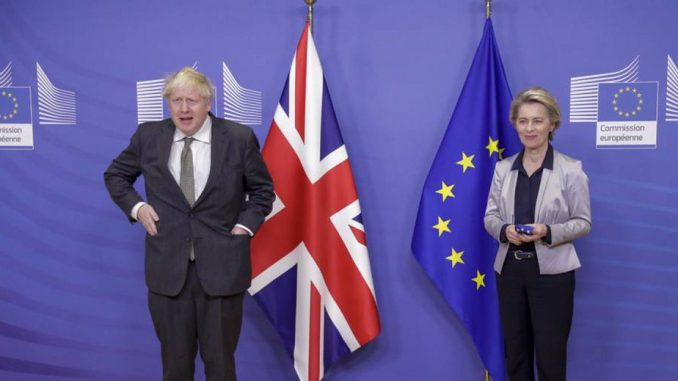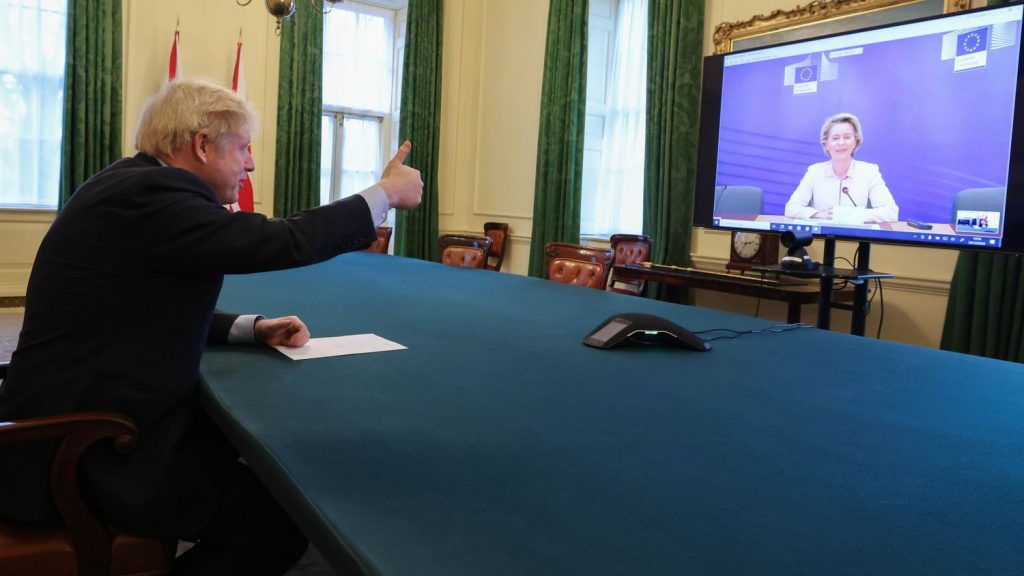
The divorce was consummated under bourgeois rules, away from the needs of the people.
By Ruben Tzanoff
The European Union (EU) was founded in 1993 with 28 members. In 2016 the United Kingdom (UK) carried out the referendum through which the withdrawal from the bloc was decided, in the process known as Brexit. From then on, Brussels and London went through a roller coaster of negotiations, threats and crises. During the beginning of 2020, they managed to set a term of transition to reach an agreement, with December 31st of that same year as the deadline. Finally, on December 24th they signed the conditions of their future trade relations. The agreement will provisionally enter into force on January 1st, 2021, until its definitive passing at the European Parliament.
Chaos, understanding, suspicion and questions The last steps of the vertiginous road in common were chaos, with uncertainty, inner pressure, thousands of truck drivers trapped in the British port of Dover due to the closure of the French border and the expansion of the new strain of coronavirus discovered in the UK.

The economic interests floating around are significant. There is an annual flow of goods of 500 billion euros that circulates between the island and the continent. In regards to fishing, the last point to reach an agreement, London agreed to allow the entering of the continental fleet to the waters under its influence in exchange for the granting of 25% of the value of the catch to the British fishing companies, with a transition of five years and a half to negotiate the installments. The EU would compensate the losses of the European fishermen with a fund of 5 billion euros.
The new regulations establish that the UK will completely withdraw from the common market and the customs union, but there will be a mutual and full opening of the markets. “The British businesses will have unlimited access to a market of 450 million people. And the European companies will be able to continue trading with the United Kingdom in the same conditions as now, which keeps open a market to which they allocate 18% of their extra-community exports.”
Both sides were satisfied with the “balance” achieved at the border of the abyss. The president of the European Commission, Ursula Von der Leyen, expressed with relief: “We can finally leave Brexit behind.” Meanwhile, the British prime minister Boris Johnson (Conservative Party) stated “…we have regained control over our laws and our destiny, fully and without restrictions.” Beyond coincidences, they established mechanisms of mutual monitoring and punishments in case of breaches. The EU fears that Johnson keeps under his sleeve the granting of competitive advantages to national businesses. On the other hand, in a controverted divorce like this, where mistrust flourishes, we will see what correlation there is between the signed papers and the economic reality, especially in the forced points of agreement that they reached or that were left on the way with fishing, Gibraltar, the financial market and North of Ireland.
The EU cannot be fixed
The imperialist bloc is trying to recover from the political crisis that it has been going through for some time, oversizing the result of its interventions. The fund of recovery will give a breath of air to the European economy, but it is not an example of the “refoundation of the EU with a solidary project” as it was presented. The agreement for the Brexit is important, but it does not magically vanish the economic impacts of the un-anchoring from one of the foundational partners of the bloc since decades, when it did not have its contemporary composition. In this stage of capitalism, the measures that entail a stable, solid lasting and real recovery of the production are not raised, as speculation dominates. In the end, money will return to the financial circuit that causes the cyclic crises and there will be more austerity measures and cuts.
Shamefully, the officials are also bragging about the beginning of the distribution and application of the Pfizer vaccine. However, there is no injection that can hide the high cost in lives that they caused with the impositions of “austerity”, cuts to healthcare, privatizations, and the uncoordinated, insufficient, unjust and authoritarian responses during the pandemic. The EU is an imperialist bloc at the service of the powerful and capitalism. Even if they paint it otherwise, it cannot be fixed.
British nightmare
Beyond the legitimate popular aspirations, Brexit ended up being dominated by an elitist perception of the UK in the global stage, under the idea of reviving the British empire. The tangible thing is that: workers suffer from job precariousness, prices rise, salaries are stagnated—in the public sector since 2008—and general strikes are illegal. The people are increasingly in worse conditions: two million people cannot feed by themselves. They depend on the good will of the people who donate food, and 33% of working-class children and immigrants go to bed without eating or being sufficiently fed. Anger is on the rise, as well as the need for the unions to lead the struggle.
With Covid-19 and the incidence of the infections with the new strains, we are seeing with more clarity the manifestation of social inequalities rooted in the British government: a poor person or an immigrant has four times the chance of getting infected and dying. The government has used the pandemic to distribute contracts to their friends, while the bourgeoise has used it to keep getting richer.
The aspirations of the powerful ones feed nationalism, racism, misogyny and the attack on immigrants. The project headed by Boris Johnson has similarities to that of Margaret Thatcher in the 80’s while, since the defeat of Jeremy Corbyn, the Labour Party is not an objector but a strong defender of the system. The bullying of Boris Johnson is not aimed at recovering the “popular sovereignty” as he tries to paint it, but to ensure the profits of the British bourgeoisie, and their economic and political interests.
The experience of the Brexit leaves one conclusion: to be successful, the rupture with the imperialist bloc of the EU must be led by the working class and the popular sectors, with an agenda of struggle to meet the social, democratic and political needs and not the interests of the rich and powerful.
Take a new road
Officials are putting the final touches to the “post-Brexit” and the “new normal”, but the road they are heading is clear. Both in the European Union and the United Kingdom, the governments will make sure the workers and the people are the ones who consequences of the health, economic and social crisis. The aid of Brussels will reach the member states generating more debt, sustaining or deepening reactionary labor reforms, attacking pensions and the public services to benefit the companies of the IBEX35. In the face of the situation that presents the continuity of the capitalist crisis, we cannot place our hopes in the actions of the bourgeoisie.
We must trust the struggle of the working class and the people that rebel throughout the world. In France, the mobilizations of the “yellow vests”, the general strikes and the confrontations against the government and the regime, project and image of a continent that accumulates contradictions, social inequality and where the struggle responses grow.
In Europe, the differences between the Social Democrat, right and far-right parties become blurry when it comes to sustain capitalism, which is a system that exploits, oppresses and destroys men and nature. It is necessary to set ourselves apart from the reformists cultists of the “lesser evil”, the “Europeanists” and the “Eurosceptics” to raise a third option, a leftist one, with class independence, consistent with the mobilization and the development of revolutionary organizations, with the strategy of a government of the workers in socialism with workers democracy. To sum up, socialism is the only system that can eliminate the exploitation of the men by men, the oppression and the destruction of nature and human propriety.








